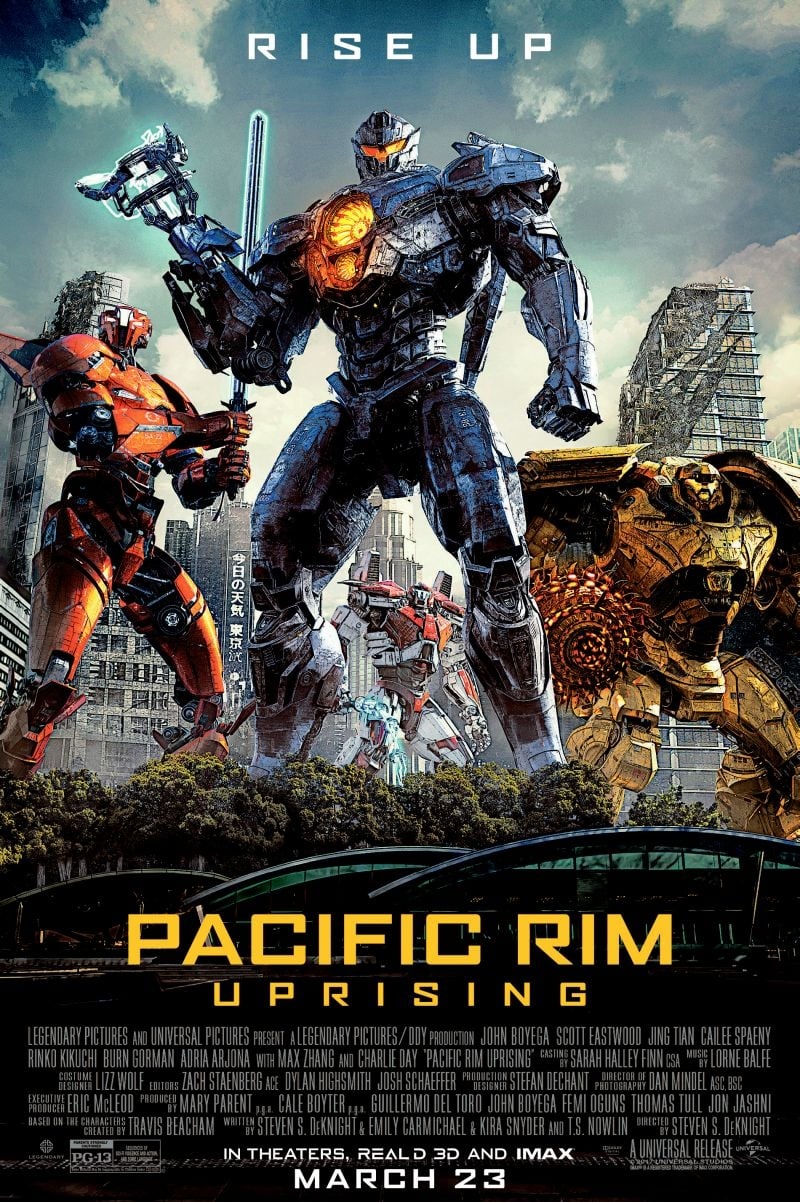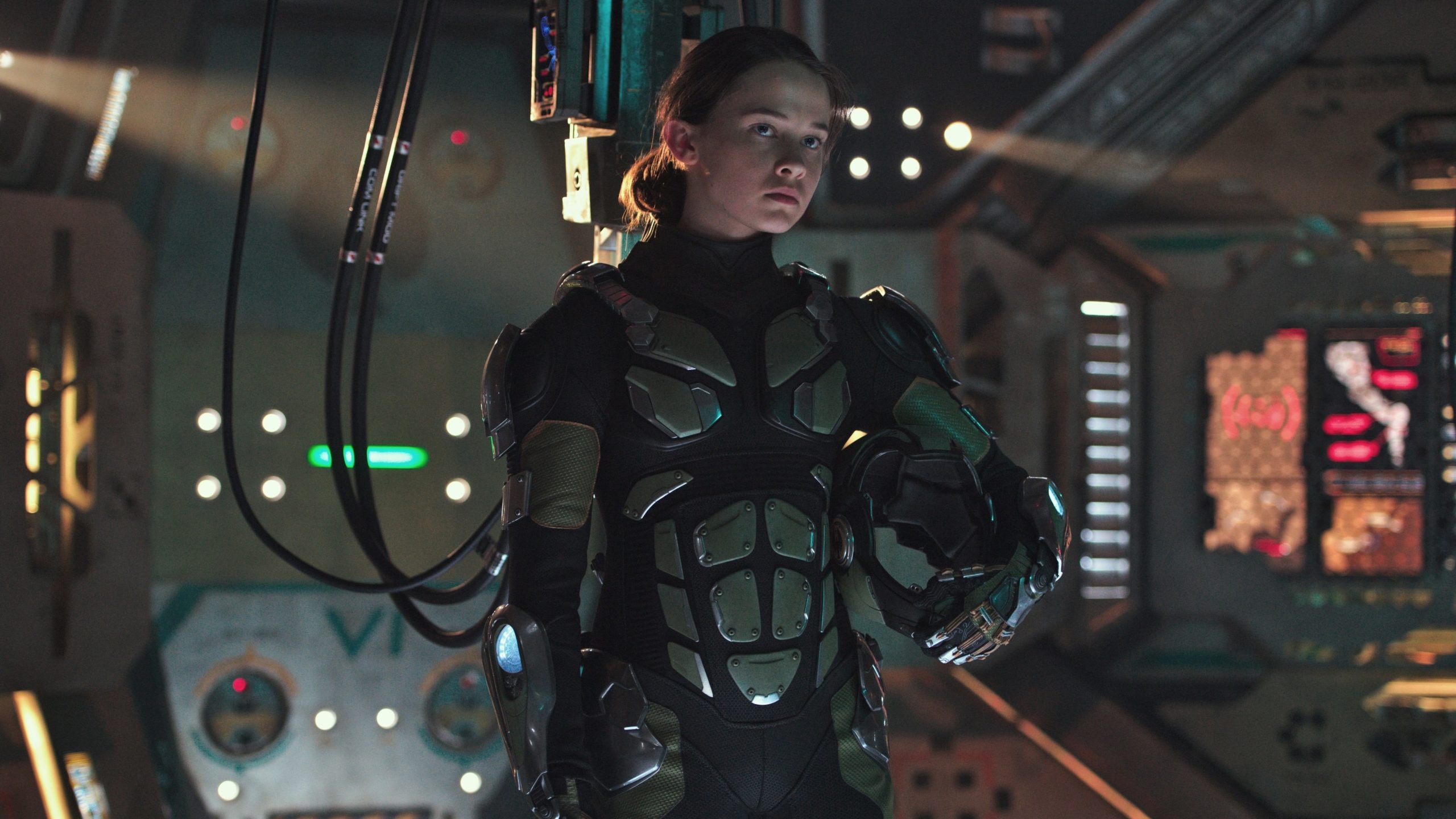
I'll mecha man out of you
The pleasures of 2013's Pacific Rim are not extreme, but they do exist, mostly because of the unstinting pleasure director Guillermo del Toro self-evidently took in his fantasy of giant robots squaring off against giant alien monsters. It stands to reason that the absence of del Toro means the absence of that pleasure and lo! it turns out to be exactly the case. First-time movie director Steven S. DeKnight, who has dabbled in directing TV, but likely got the Pacific Rim job for his work creating that Spartacus TV series few years back, is self-evidently not a True Believer the way that his predecessor was. And while I will maintain that Pacific Rim is among del Toro's weakest films, there's no comparing even weak del Toro with the why-bother journeyman work that's gone into every facet of Pacific Rim: Uprising.
Or maybe not every facet. The sequel is not even a little bit interested in world building, but it feints in that direction long enough at the start that it seems like there might have been a worthy film to be find in exploring how society has re-oriented itself in the wake of the devastation so barely averted ten years ago (when del Toro was going to direct the sequel, this was supposedly exactly the thing he wanted to focus on). And for several minutes at the beginning, that is almost what we get, seeing how one Jake Pentecost (John Boyega), dissolute son of the late hero Stacker Pentecost, has set about making a life for himself by exploiting the black market in the wasteland that used to be Santa Monica. By the way, the incalculable trade-down from the name "Stacker Pentecost" to "Jake Pentecost" is a good microcosm of how the overall quality of this film has fallen from the first (where ridiculous character names were a bit of an art form).
After that, it turns into Top Gun even more thoroughly than the original one did, with Jake turning out to be a hotshot Jaeger pilot - "Jaeger" being the term for the giant robots humanity built to fight the alien kaiju - who washed out of the program, but has to come back and deal with his square rival, Nate Lambert (Scott Eastwood, Clint's son, getting his first showcase role after several years in the trenches; he resembles his father with all the charisma surgically removed). Also to train the next generation, including scrappy wasteland survivor Amara Namani (Cailee Spaeny). So actually, scratch that, not Top Gun - what this really, really reminds me off is a mixture of Independence Day: Resurgence and one of the many abandoned subplots from Transformers: The Last Knight, and while either one of those would be an absolutely horrid thing to be reminded of, both of them is just pure overkill.
Anyway, there's a plot, and it's needlessly complicated, which means it opens itself up to being full of holes (only one of which actively bothered me while watching: there's a trip to Siberia that serves no discernible purpose, and the movie all but deliberately calls attention to this). It also has at least three working subplots, which is definitely one more than the filmmakers have the attention span for; the most interesting, by virtue of being the least trite, is the one where Dr. Hermann Gottlieb (Burn Gorman) and Dr. Newton Geiszler (Charlie Day), heroes of the 10-year-old war who know find themselves at odds, owing to Gottlieb's messianic attempts to build new defenses and Geiszler's sheepish role as a corporate stooge for arms manufacture Liwen Shao (Tian Jing).
The plot, though, isn't really the purpose of being here: it's the big robot-on-robot fight showpieces (the monsters are cagily held back, for plot as well as spectacle reasons), attempting to correct one of the broadly agreed-upon flaws of the original film, which is that all the action took place on rainy nights. Here, it all takes place in broad daylight, and that's not as good a choice as one might have hoped; but I think the quality of the effects is secondary to the rather limp, repetitive fight choreography, which is maybe the clearest sign that the people making this film did not have the zealous commitment that the people making the last film did: while Pacific Rim transparently displays its debt to Japanese movies and TV shows, Uprising is much more of a generic action movie, one that only seems to grasp the essential joy of a proper daikaiju eiga brawl in a few beats of its last big fight, when Tokyo (aye, Tokyo!) witnesses the indignity of huge skyscrapers being ripped up and tossed around.
The fights are fine, the CGI is fine, the music is much less than fine, and points it out when it once and only once borrows Ramin Djawadi's big main theme from the last movie, demonstrating just how lifeless Lorne Balfe's new score is in comparison. The plot is a grind, made up of nothing but clichéd conflicts between clichéd characters, but presented without the vigor of before (there is, however, a small dollop of self-aware humor that almost compensates for it). If there is one bright light in all this, it's that Boyega (using his native English accent for the first time since he got snatched up by Hollywood) is a terrifically appealing lead, much more so than Charlie Hunnam was in the first movie. Which is no achievement at all - any random grocery store bag boy or gas station attendant would also be a more appealing lead than Charlie Hunnam - but still, seeing Boyega get to do something with more layers and sharp edges than his Star Wars goofball is good for the soul, and even if he is working through a profoundly overfamiliar character arc (daddy issues, short-temper, selfish, unpatriotic, the whole nine yards), he does it with enough force and belief in the role that he can, however slightly, remind us of the pleasure of formula done well. So that's one thing to take joy in; the inherent pleasure of watching big robots with swords for arms walloping each other is another. It's still awfully boring all in all, and that's a terrible problem for such an empty-headed popcorn movie, but it's not the most boring. And at least, unlike a Transformers picture, it has a comprehensible plot. Small victories.
Or maybe not every facet. The sequel is not even a little bit interested in world building, but it feints in that direction long enough at the start that it seems like there might have been a worthy film to be find in exploring how society has re-oriented itself in the wake of the devastation so barely averted ten years ago (when del Toro was going to direct the sequel, this was supposedly exactly the thing he wanted to focus on). And for several minutes at the beginning, that is almost what we get, seeing how one Jake Pentecost (John Boyega), dissolute son of the late hero Stacker Pentecost, has set about making a life for himself by exploiting the black market in the wasteland that used to be Santa Monica. By the way, the incalculable trade-down from the name "Stacker Pentecost" to "Jake Pentecost" is a good microcosm of how the overall quality of this film has fallen from the first (where ridiculous character names were a bit of an art form).
After that, it turns into Top Gun even more thoroughly than the original one did, with Jake turning out to be a hotshot Jaeger pilot - "Jaeger" being the term for the giant robots humanity built to fight the alien kaiju - who washed out of the program, but has to come back and deal with his square rival, Nate Lambert (Scott Eastwood, Clint's son, getting his first showcase role after several years in the trenches; he resembles his father with all the charisma surgically removed). Also to train the next generation, including scrappy wasteland survivor Amara Namani (Cailee Spaeny). So actually, scratch that, not Top Gun - what this really, really reminds me off is a mixture of Independence Day: Resurgence and one of the many abandoned subplots from Transformers: The Last Knight, and while either one of those would be an absolutely horrid thing to be reminded of, both of them is just pure overkill.
Anyway, there's a plot, and it's needlessly complicated, which means it opens itself up to being full of holes (only one of which actively bothered me while watching: there's a trip to Siberia that serves no discernible purpose, and the movie all but deliberately calls attention to this). It also has at least three working subplots, which is definitely one more than the filmmakers have the attention span for; the most interesting, by virtue of being the least trite, is the one where Dr. Hermann Gottlieb (Burn Gorman) and Dr. Newton Geiszler (Charlie Day), heroes of the 10-year-old war who know find themselves at odds, owing to Gottlieb's messianic attempts to build new defenses and Geiszler's sheepish role as a corporate stooge for arms manufacture Liwen Shao (Tian Jing).
The plot, though, isn't really the purpose of being here: it's the big robot-on-robot fight showpieces (the monsters are cagily held back, for plot as well as spectacle reasons), attempting to correct one of the broadly agreed-upon flaws of the original film, which is that all the action took place on rainy nights. Here, it all takes place in broad daylight, and that's not as good a choice as one might have hoped; but I think the quality of the effects is secondary to the rather limp, repetitive fight choreography, which is maybe the clearest sign that the people making this film did not have the zealous commitment that the people making the last film did: while Pacific Rim transparently displays its debt to Japanese movies and TV shows, Uprising is much more of a generic action movie, one that only seems to grasp the essential joy of a proper daikaiju eiga brawl in a few beats of its last big fight, when Tokyo (aye, Tokyo!) witnesses the indignity of huge skyscrapers being ripped up and tossed around.
The fights are fine, the CGI is fine, the music is much less than fine, and points it out when it once and only once borrows Ramin Djawadi's big main theme from the last movie, demonstrating just how lifeless Lorne Balfe's new score is in comparison. The plot is a grind, made up of nothing but clichéd conflicts between clichéd characters, but presented without the vigor of before (there is, however, a small dollop of self-aware humor that almost compensates for it). If there is one bright light in all this, it's that Boyega (using his native English accent for the first time since he got snatched up by Hollywood) is a terrifically appealing lead, much more so than Charlie Hunnam was in the first movie. Which is no achievement at all - any random grocery store bag boy or gas station attendant would also be a more appealing lead than Charlie Hunnam - but still, seeing Boyega get to do something with more layers and sharp edges than his Star Wars goofball is good for the soul, and even if he is working through a profoundly overfamiliar character arc (daddy issues, short-temper, selfish, unpatriotic, the whole nine yards), he does it with enough force and belief in the role that he can, however slightly, remind us of the pleasure of formula done well. So that's one thing to take joy in; the inherent pleasure of watching big robots with swords for arms walloping each other is another. It's still awfully boring all in all, and that's a terrible problem for such an empty-headed popcorn movie, but it's not the most boring. And at least, unlike a Transformers picture, it has a comprehensible plot. Small victories.






